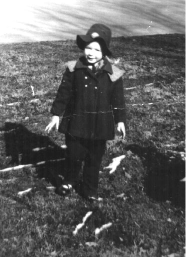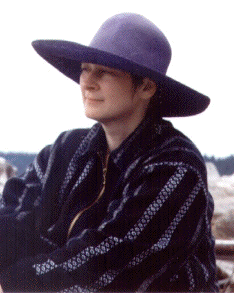

All sentient creatures devote a certain amount of their existence to figuring things out, humans more than most. One of the ways I've always gone about figuring things out is by telling myself stories about myself (and about the world and about my relations therein). While throughout my life I've told myself a series of successively different stories about my drive to creative work, such stories almost always begin the same-- with a recollection of two of my earliest memories that I at some point came to join with an arbitrary hinge. The scene of both memories is my grandparents' house. One of them I can place as having occurred sometime before I began kindergarten (which was a month before my fifth birthday), but the other memory, to which I tend to grant priority, is a moment without temporal markers that floats unanchored, as any notion of origin does, representing the moment when I became conscious of the poower of the aesthetic to transport me elsewhere, into another reality that co-exists with the mundane.
Memory 1 is a story I've told myself-- and until now, almost no one else-- all my life. It is the emblem for my deep creative and aesthetic passion. While I was a child, it signified my difference from others as well as my intimacy with the ecstatic, which I soon found accessible through music. The fact that this passion was off the visible spectrum of everyone in my family and most of my peers (until I reached high school) gave me a world private from everyone around me-- though still real if otherwhere-- a world I at first longed to belong to and then gradually came to believe I did indeed belong to. I'm speaking of the world made up of composers and musicians who made the passion possible. How I hinged together Memory 1 and Memory 2 into the same story can be best illustrated by a third, later memory.
Mr. Becker passes out songbooks, and I get my first look at musical notation. Some of the third-graders know the songs in the book. Mr. Becker conducts the class through each song, and some of us second-graders pick up the melodies by ear and find the lyrics in the songbook. In the process, I suddenly understand-- in an epiphany as wonderful as the moment when I understood subtraction, another conceptual breakthrough of the second grade-- that the musical notation corresponds to the notes we are singing. And so it is that when the auditioning begins, and it comes my turn to sing by myself, I read the notes and sing them clearly and on key with the greatest confidence and pleasure. And voila! I'm chosen to sing in the choir. My only disappointment comes when I am required, like everyone else, to hand in the song book. Later, one of my prized possessions will be a hymnal, given me by my grandmother, enabling me to play my favorite hymns, all based on Bach chorale tunes, on the piano, as well as to sing the liturgical forms that at that time are seldom used by our congregation. Reading notes off the page was like magic. It was like learning to tie my shoes, or figuring out the conceptual basis of subtraction. Reading notes of the page gave me an "in" to the music. It drew me in rather than excluding me. It allowed me to share in its passion and power-- share in creating it-- rather than feel myself annihilated by something so overwhelmingly powerful outside of me.
It was no accident that I began my first forays into improvisation during the technique period of my practice. After completing each scale, I played arpeggios in the tonic, subdominant and dominant followed by a modulation of triads to take me into the next key up or down the circle of fifths. What could be more natural than to make my modulations, using triads in different positions and arpeggios, increasingly elaborate? Long before I began formal lessons in theory, my ear learned everything it needed to know about the structure of diatonic tonality (though I admit that it was only through theory lessons that I divined the workings of the augmented fifths and sequences that so fascinated me).
It was awareness of structures-- theory-- or, in other words, rules that first impelled me to improvise. When my parents heard me improvising, though, they scolded me for not playing my "lesson." "That's not your lesson," I would be told. "Don't play around. Practice your lesson." Which was "real." "Real" music, the assigned text, so to speak. Needless to say, having been told I couldn't improvise, I began to get sneaky. I began carrying the ideas I had for making music around in my head and secretly drawing staves on unruled paper and writing those ideas down. Which in turn led to my coming up with more formally structured compositions rather than the free-form passages I "through-composed" at the keyboard. For years I clandestinely manufactured my home-made staff paper and surreptitiously scribbled compositions I sneaked to the piano to play. Some of these I "practiced" openly, "real" enough to my parents' ears that they couldn't tell it was mine if they weren't in the room, seeing me play off homemade sheets of music.
In high school, when I began taking advanced theory classes, my proficiency in dictation, sight-singing and improvising from figured basses gave me a special place in the instructor's heart. When she began assigning us little compositions, I joyfully came out of the closet-- though I had to "follow the rules" in them, and thus wrote only in 17th, 18th and 19th century styles. (Nineteenth century styles interested me mostly for the extent to which they taught me how cleverly rules could be stretched.) I learned orchestration so well that I could hear an orchestral score in my head just by looking at it. But when she taught us the medieval modes-- giving us a new set of rules, a new set of sounds to work with, I found my opening into what I would later learn to call, in college, "New Music." (The next set of "rules" I chose to adopt would be the principles of the twelve-tone system, while all my subsequent sets of "rules" would be of my own invention.) My parents had forgotten about my earlier forays into improvisation and their censoring of it. Now I openly played elaborate pieces of my own music and spent hours improvising free-form-- with their approval. It had become legitimate, it was now considered "real" music. They did hate, though, my never turning off the music inside my head. It was with me all the time, my constant companion. When things got too dire at the dinner table, I could retreat into it as though rocketing through a wormhole into another galaxy. I not only had an "in," I was almost entirely inside the music most of the time. I might be excluded from most social groupings, but not from that whole world that music represented to me, and not from the strange group of like-minded souls that inhabited that world, too. Even when other music students didn't particularly like me as a person, they accepted-- and recognized-- me.
Understanding and even mastering the "rules" governing western musical structures let me "inside" not only through performance and composition, but through listening as well. Developing listening chops allowed me to listen actively, to participate in the making of the music inside my head as well as in my body, where I physically felt its effects. Because I understood what I was hearing, I could handle the intensity, and direct my concentration to an intellectual as well as physical and emotional appreciation of what I was hearing. When in early childhood music made me cry, it was because I perceived my senses to be assaulted by a vast, powerful intensity I didn't know how to be an active part of. As an adult I can recognize that activities like listening to music and reading text become ever more pleasurable the more actively one undertakes them. Active listening and reading requires first understanding what the underlying structures governing the music and texts are, and second appreciating-- and therefore amplifying---in one's imagination what is creatively done within those structures. The most elementary kind of listening, to, say, a Mozart symphony, entails knowledge of classical symphonic form (especially the very basic skeleton of the sonata allegro form as well as other possible forms movements can take) and being able to hear tonal movement from tonic to subdominant to dominant and back to tonic, as well as the statement and development themes or motives and their appearances in different voices. More sophisticated listening includes being able to recognize the notes one hears, distinguish relations between voices and even the discrete voicing within the larger homophonic harmony, so that even as one hears the chordal progressions which delineate the harmonic structures of the music, one is at the same time distinguishing plural individual lines as they play against-- and with-- the others.
Music is yes. It is productive, creative affirmation. Music is the opposite of no, of exclusion, division, and negation. (It is the negation of negation.) It takes the body, the mind, the soul to make music, all together at once. Nothing is like it. Music is perfect love, the kind that is said to cast out fear. What caused me pain as a small child was not knowing how to become one with it (and not be swallowed up or annihilated by its power). With my first steps of mastery, I not only gained entry into its wonderful, affirmative wholeness, but I discovered the desire to be always inside that ecstatic wholeness. Inside its ecstasy, I knew the most uninhibited playing out of impulses to excess. Within its rules and structures, I could do and will anything and-- even more exciting-- carry others like me to the places I had the will to lead. To be carried outside the boundaries constraining one as this or that (which is how, as an adolescent, I saw everything else in the world around me)-- into a place elsewhere--this I wanted to have, all the time, every waking moment of my life. (For a time, I extended this being carried off into needing to carry others off with me.) Living inside music offered a grand temptation that proved, finally, impossible. To live always in that wonderful elsewhere would be a kind of madness. Can there be too much yes? Perhaps those who spend all their lives as musicians and composers are never forced to give it up, never forced to live at all in the ordinary reality that is just one damned no to life and pleasure and affirmation after another. I don't suppose I'll ever know.

And yet I have been given the legacy of that
childhood learning how to get inside the yes. My writing
often takes me there, my listening to music lets me briefly
back in, both of these more completely even than watching
the ocean surf have its way with the coast or the sunset
spread over the Olympics can do.
Seattle